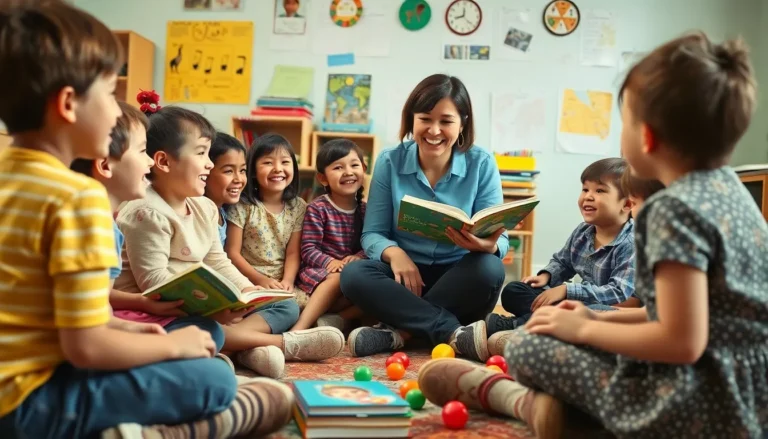Table of Contents
ToggleNavigating the wild world of parenting can feel like trying to assemble IKEA furniture without the instructions—confusing and slightly terrifying. New parents often find themselves buried under a mountain of advice, from well-meaning relatives to the internet’s infinite rabbit holes. But fear not! The right parenting books can be the lifeline that transforms chaos into calm, or at least a manageable level of chaos.
These books offer insights and strategies that can make the transition to parenthood a little less daunting. With humor and wisdom, they tackle everything from diaper disasters to sleep strategies, helping new parents feel like they’re not alone in this rollercoaster ride. So grab a cup of coffee (or three) and discover the best parenting books that promise to guide, support, and maybe even make you chuckle through those sleepless nights.
Top Parenting Books for New Parents
Numerous parenting books cater to new parents, offering valuable insights. What to Expect the First Year by Heidi Murkoff serves as a comprehensive guide, covering everything from feeding to developmental milestones. The Whole-Brain Child by Daniel J. Siegel and Tina Payne Bryson explains brain development and effective parenting techniques, allowing parents to nurture their child’s emotional and intellectual growth.
Another noteworthy title is Cribsheet by Emily Oster, which presents data-driven approaches to parenting decisions. The book analyzes common parenting choices, helping parents make informed decisions based on empirical evidence. Simplicity Parenting by Kim John Payne focuses on reducing clutter and streamlining family life, promoting a calmer home environment for both parents and children.
How to Talk So Kids Will Listen & Listen So Kids Will Talk by Adele Faber and Elaine Mazlish provides practical communication strategies. This book emphasizes understanding and respecting children’s feelings, fostering a harmonious parent-child relationship. Baby 411 by Ari Brown and Denise Fields is another essential resource, filled with straightforward information for new parents navigating baby care.
Lastly, The Happiest Baby on the Block by Harvey Karp offers techniques to soothe fussy infants. Karp’s approach involves understanding newborn needs, emphasizing the importance of creating a calming environment. With these authoritative resources, new parents can find guidance and reassurance during the often overwhelming early stages of child-rearing.
Classic Parenting Guides
Classic parenting books offer essential insights for new parents navigating the challenges of early childhood. Timeless advice from these resources simplifies decision-making during a critical period.
The Importance of Time-Tested Wisdom
Time-tested wisdom provides a solid foundation for parenting. New parents gain confidence by relying on proven strategies, eliminating much uncertainty. Experts emphasize that decades of research back the advice found in classic books. Practical tactics address common concerns such as sleep, feeding, and child development. Using these insights helps parents build lasting bonds with their children. Many find comfort in knowing they aren’t alone; established authors share their experiences and validate the feelings of uncertainty and joy.
Key Takeaways from Classic Titles
Key takeaways from classic parenting titles highlight valuable lessons for caregivers. “What to Expect the First Year” breaks down the first 12 months, covering everything from developmental milestones to feeding practices. “The Whole-Brain Child” teaches parents how brain development impacts behavior and emotional regulation. Data-driven perspectives from “Cribsheet” help parents make informed choices. “Simplicity Parenting” promotes a decluttered environment to enhance family well-being. Communication techniques found in “How to Talk So Kids Will Listen” allow for more effective interactions. Lastly, “The Happiest Baby on the Block” offers practical methods to soothe infants, aiding sleep and reducing stress in the home.
Modern Approaches to Parenting
Modern parenting emphasizes flexibility and adaptability in raising children. New parents often benefit from fresh perspectives that contemporary writers provide.
The Influence of Contemporary Writers
Contemporary writers play a vital role in shaping parenting techniques. They incorporate research, psychology, and personal experiences into their narratives. Writers like Emily Oster and Daniel J. Siegel challenge traditional views and encourage evidence-based approaches. Insights from these authors help parents make informed decisions by understanding child development and practical strategies. They also foster open dialogue about parenting challenges, promoting a community of shared experiences and support.
Popular Modern Parenting Books
Several modern parenting books resonate with new parents seeking guidance. “Cribsheet” by Emily Oster delivers data-driven insights, addressing common dilemmas with practical solutions. “The Whole-Brain Child” by Daniel J. Siegel and Tina Payne Bryson provides actionable techniques for nurturing cognitive and emotional development. “How to Talk So Kids Will Listen & Listen So Kids Will Talk” by Adele Faber and Elaine Mazlish offers communication skills that enhance parent-child relationships. Each of these books equips parents with valuable tools, simplifying complex parenting journeys while fostering deeper connections with their children.
Choosing the Right Book for Your Needs
Selecting a parenting book that aligns with specific needs simplifies the transition into parenthood. Books vary greatly in focus and style, making it essential to identify priorities.
Factors to Consider
Consider the specific challenges faced during the first year of parenting when choosing a book. Look for topics like sleep training, feeding schedules, or developmental milestones. Evaluate the author’s background; reputable authors often provide credible insights. Think about preferred reading styles; some may favor evidence-based content while others appreciate conversational tones. Highlight practical tips over theories, since actionable advice proves beneficial in real-life scenarios.
Recommended Reading Lists
Explore curated reading lists that cater to new parents’ diverse needs. “What to Expect the First Year” offers extensive guidance on feeding and development. “The Whole-Brain Child” emphasizes understanding cognitive growth through nurturing techniques. “Cribsheet” provides data-driven insights that aid in making informed parenting decisions. For effective communication, “How to Talk So Kids Will Listen” delivers essential strategies to foster dialogue and relationship building. Finally, look at “Simplicity Parenting,” which focuses on creating a streamlined environment, essential for a calmer household.
Additional Resources for New Parents
New parents benefit from various resources that provide support and guidance. Online forums offer community engagement where parents can share experiences and advice. Social media groups create spaces to connect with others navigating similar challenges. Local parenting classes provide hands-on learning opportunities, covering essentials like infant care and sleep strategies.
Podcasts serve as another valuable resource, featuring expert discussions on parenting topics. Many podcasts invite child development specialists to share insights, making complex concepts more accessible. Blogs written by experienced parents and professionals supplement these discussions, offering practical tips and personal anecdotes. These written resources often include checklists, product recommendations, and strategies for common parenting challenges.
Mobile apps act as convenient tools for tracking milestones and sleep patterns. Popular apps provide daily tips that adapt to a child’s specific age and development stage. Each app varies in its features, helping parents manage schedules and organize tasks efficiently.
Websites focusing on parenting provide articles and guides that cover a wide range of topics. Many reputable sites offer evidence-based information, further enriching a parent’s knowledge base. Nonprofit organizations also offer resources related to child development, health, and nutrition, supporting parents in informed decision-making.
Bookshelves filled with parenting literature complement these resources, ensuring comprehensive support. Many titles offer insights reflective of current trends, helping parents navigate the evolving landscape of childrearing. Engaging with these diverse resources equips new parents with the knowledge and community needed to thrive during their parenting journey.
Navigating the early days of parenthood can feel daunting but the right resources can make all the difference. Parenting books offer essential insights and practical strategies that empower new parents to tackle challenges with confidence. By exploring a variety of titles tailored to their needs, parents can find guidance that resonates with their unique situations.
In addition to books, the wealth of online resources and community support further enriches the parenting journey. Combining literature with modern tools allows new parents to build a solid foundation for their child’s development while fostering a nurturing environment. Embracing this knowledge equips parents to enjoy the rewarding experience of raising their little ones.







